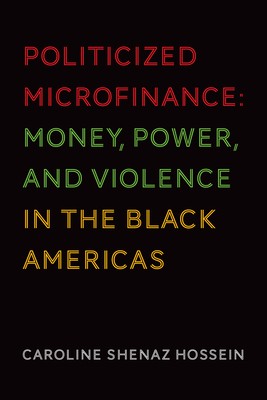
- We will send in 10–14 business days.
- Author: Caroline Shenaz Hossein
- Publisher: University of Toronto Press
- ISBN-10: 1442616245
- ISBN-13: 9781442616240
- Format: 15.2 x 22.6 x 1.5 cm, softcover
- Language: English
- SAVE -10% with code: EXTRA
Reviews
Description
When Grameen Bank was awarded the Nobel Peace Prize in 2006, microfinance was lauded as an important contributor to the economic development of the Global South. However, political scandals, mission-drift, and excessive commercialization have tarnished this example of responsible or inclusive financial development. Politicized Microfinance insightfully discusses exclusion while providing a path towards redemption.
In this work, Caroline Shenaz Hossein explores the politics, histories and social prejudices that have shaped the legacy of microbanking in Grenada, Guyana, Haiti, Jamaica and Trinidad. Writing from a feminist perspective, Hossein's analysis is rooted in original qualitative data and offers multiple solutions that prioritize the needs of marginalized and historically oppressed people of African descent.
A must read for scholars of political economy, diaspora studies, social economy, women's studies, as well as development practitioners, Politicized Microfinance convincingly deftly argues for microfinance to return to its origins as a political tool, fighting for those living in the margins.
EXTRA 10 % discount with code: EXTRA
The promotion ends in 14d.01:18:29
The discount code is valid when purchasing from 10 €. Discounts do not stack.
- Author: Caroline Shenaz Hossein
- Publisher: University of Toronto Press
- ISBN-10: 1442616245
- ISBN-13: 9781442616240
- Format: 15.2 x 22.6 x 1.5 cm, softcover
- Language: English English
When Grameen Bank was awarded the Nobel Peace Prize in 2006, microfinance was lauded as an important contributor to the economic development of the Global South. However, political scandals, mission-drift, and excessive commercialization have tarnished this example of responsible or inclusive financial development. Politicized Microfinance insightfully discusses exclusion while providing a path towards redemption.
In this work, Caroline Shenaz Hossein explores the politics, histories and social prejudices that have shaped the legacy of microbanking in Grenada, Guyana, Haiti, Jamaica and Trinidad. Writing from a feminist perspective, Hossein's analysis is rooted in original qualitative data and offers multiple solutions that prioritize the needs of marginalized and historically oppressed people of African descent.
A must read for scholars of political economy, diaspora studies, social economy, women's studies, as well as development practitioners, Politicized Microfinance convincingly deftly argues for microfinance to return to its origins as a political tool, fighting for those living in the margins.


Reviews